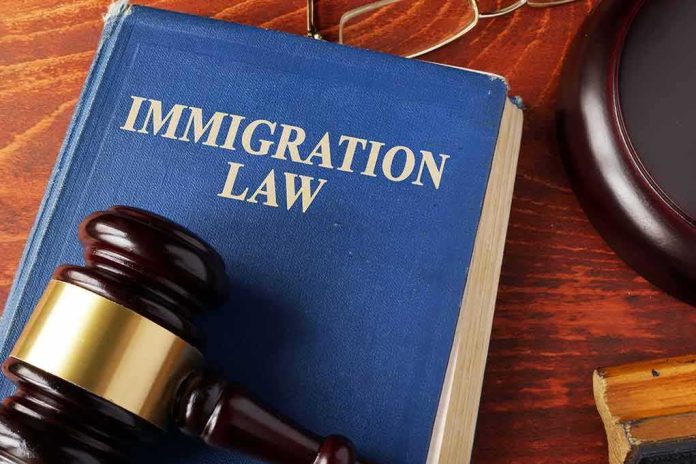
The Trump administration empowers DHS to immediately fine illegal immigrants up to $1,000 daily without warning, eliminating the previous 30-day notice requirement.
Key Takeaways
- New DHS and DOJ rule eliminates the 30-day notification period before issuing fines to illegal immigrants, allowing for immediate penalties
- Fines range from $100-$500 for illegal entry, up to $10,000 for non-compliance with deportation orders, and up to $1,000 per day for ignoring removal orders.
- The DHS has already issued 10,000 fine notifications as of June 13 under the Trump administration’s renewed enforcement efforts.
- Illegal immigrants can avoid fines by self-deporting through the CBP Home app.
Streamlined Penalties for Immigration Violations
President Trump’s administration has taken decisive action to enforce immigration laws by implementing a new rule that streamlines the process of issuing fines to individuals residing illegally in the United States. The Departments of Homeland Security and Justice announced on June 27 that they are eliminating the previously required 30-day notification period before issuing fines to illegal immigrants. This change allows immigration officers to send fines directly through regular mail and shortens the process for contesting these penalties, ensuring faster enforcement outcomes against those who violate immigration laws.
“DHS believes that the nature of the failure-to-depart and unlawful entry penalties supports the need for more streamlined procedures,” said Assistant DHS Secretary Tricia McLaughlin.
The streamlined process specifically targets three groups: individuals who entered the country illegally, those who have ignored removal orders, and those who failed to comply with voluntary departure orders. The enforcement mechanism includes substantial financial penalties that escalate based on the nature and duration of the violation. For illegal entry alone, fines range from $100 to $500. Non-compliance with deportation orders can result in fines up to $10,000, while ignoring removal orders can lead to penalties of up to $1,000 per day.
Renewed Enforcement Under Trump’s Leadership
This enforcement strategy represents a revival of policies that were initially implemented during President Trump’s first term but were subsequently halted during the Biden administration. Since returning to the office, President Trump has recommitted to enforcing immigration laws with real consequences for violators. As part of this renewed enforcement effort, the Department of Homeland Security has already issued 10,000 fine notifications as of June 13, demonstrating the administration’s commitment to addressing illegal immigration through meaningful penalties.
“The law doesn’t enforce itself; there must be consequences for breaking it,” said Assistant DHS Secretary Tricia McLaughlin.
The previous system, which required a 30-day notice period before fines could be issued, created unnecessary delays in enforcement actions. “The current process requires giving illegal aliens 30 days’ notice of the intent to fine them before a fine is issued,” explained a statement from the administration. This procedural requirement has now been eliminated, allowing for more immediate consequences when immigration laws are violated. The streamlined approach aligns with the Trump administration’s broader strategy of deterring illegal immigration through consistent enforcement.
Pathways to Compliance and Fine Avoidance
While implementing stricter enforcement measures, the Trump administration is also providing pathways for illegal immigrants to come into compliance with the law. The Department of Homeland Security is actively encouraging self-deportation through the CBP Home app, offering to waive potential fines for those who voluntarily comply with immigration laws. This approach provides an incentive for illegal immigrants to depart voluntarily rather than facing escalating financial penalties and potential legal consequences.
Immigration enforcement agencies now have greater authority to issue fines through regular mail delivery, simplifying the notification process and reducing administrative barriers to enforcement. Additionally, the streamlined procedures for contesting fines are designed to expedite case resolution, allowing immigration authorities to more efficiently process violations and enforce penalties. These changes represent a significant shift toward more immediate and effective immigration enforcement under President Trump’s leadership.













